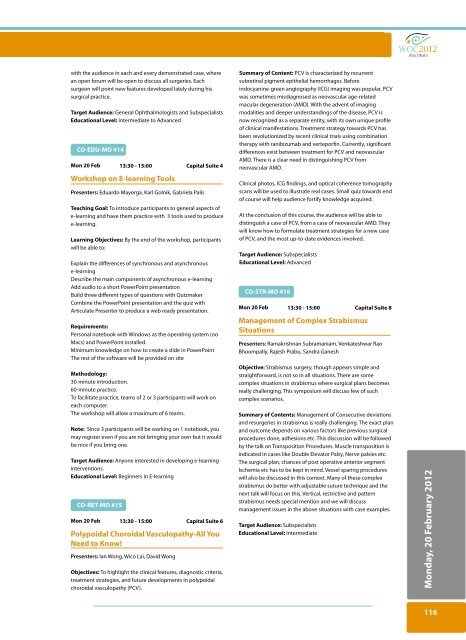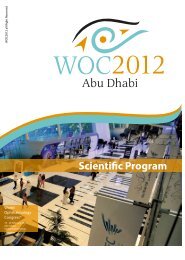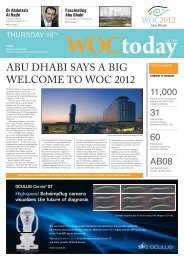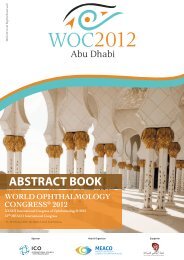ScientiËc Program - WOC2012
ScientiËc Program - WOC2012
ScientiËc Program - WOC2012
You also want an ePaper? Increase the reach of your titles
YUMPU automatically turns print PDFs into web optimized ePapers that Google loves.
with the audience in each and every demonstrated case, where<br />
an open forum will be open to discuss all surgeries. Each<br />
surgeon will point new features developed lately during his<br />
surgical practice.<br />
Target Audience: General Ophthalmologists and Subspecialists<br />
Educational Level: Intermediate to Advanced<br />
CO-EDU-MO 414<br />
Mon 20 Feb 13:30 - 15:00 Capital Suite 4<br />
Workshop on E-learning Tools<br />
Presenters: Eduardo Mayorga, Karl Golnik, Gabriela Palis<br />
Teaching Goal: To introduce participants to general aspects of<br />
e-learning and have them practice with 3 tools used to produce<br />
e-learning.<br />
Learning Objectives: By the end of the workshop, participants<br />
will be able to:<br />
Explain the differences of synchronous and asynchronous<br />
e-learning<br />
Describe the main components of asynchronous e-learning<br />
Add audio to a short PowerPoint presentation<br />
Build three different types of questions with Quizmaker<br />
Combine the PowerPoint presentation and the quiz with<br />
Articulate Presenter to produce a web ready presentation.<br />
Requirements:<br />
Personal notebook with Windows as the operating system (no<br />
Macs) and PowerPoint installed.<br />
Minimum knowledge on how to create a slide in PowerPoint<br />
The rest of the software will be provided on site<br />
Methodology:<br />
30-minute introduction.<br />
60-minute practice.<br />
To facilitate practice, teams of 2 or 3 participants will work on<br />
each computer.<br />
The workshop will allow a maximum of 6 teams.<br />
Note: Since 3 participants will be working on 1 notebook, you<br />
may register even if you are not bringing your own but it would<br />
be nice if you bring one.<br />
Target Audience: Anyone interested in developing e-learning<br />
interventions.<br />
Educational Level: Beginners in E-learning<br />
CO-RET-MO 415<br />
Mon 20 Feb 13:30 - 15:00 Capital Suite 6<br />
Polypoidal Choroidal Vasculopathy-All You<br />
Need to Know!<br />
Presenters: Ian Wong, Wico Lai, David Wong<br />
Objectives: To highlight the clinical features, diagnostic criteria,<br />
treatment strategies, and future developments in polypoidal<br />
choroidal vasculopathy (PCV).<br />
Summary of Content: PCV is characterized by recurrent<br />
subretinal pigment epithelial hemorrhages. Before<br />
indocyanine-green angiography (ICG) imaging was popular, PCV<br />
was sometimes misdiagnosed as neovascular age-related<br />
macular degeneration (AMD). With the advent of imaging<br />
modalities and deeper understandings of the disease, PCV is<br />
now recognized as a separate entity, with its own unique profile<br />
of clinical manifestations. Treatment strategy towards PCV has<br />
been revolutionized by recent clinical trials using combination<br />
therapy with ranibizumab and verteporfin. Currently, significant<br />
differences exist between treatment for PCV and neovascular<br />
AMD. There is a clear need in distinguishing PCV from<br />
neovascular AMD.<br />
Clinical photos, ICG findings, and optical coherence tomography<br />
scans will be used to illustrate real cases. Small quiz towards end<br />
of course will help audience fortify knowledge acquired.<br />
At the conclusion of this course, the audience will be able to<br />
distinguish a case of PCV, from a case of neovascular AMD. They<br />
will know how to formulate treatment strategies for a new case<br />
of PCV, and the most up-to-date evidences involved.<br />
Target Audience: Subspecialists<br />
Educational Level: Advanced<br />
CO-STR-MO 416<br />
Mon 20 Feb 13:30 - 15:00 Capital Suite 8<br />
Management of Complex Strabismus<br />
Situations<br />
Presenters: Ramakrishnan Subramaniam, Venkateshwar Rao<br />
Bhoompally, Rajesh Prabu, Sandra Ganesh<br />
Objective: Strabismus surgery, though appears simple and<br />
straightforward, is not so in all situations. There are some<br />
complex situations in strabismus where surgical plans becomes<br />
really challenging. This symposium will discuss few of such<br />
complex scenarios.<br />
Summary of Contents: Management of Consecutive deviations<br />
and resurgeries in strabismus is really challenging. The exact plan<br />
and outcome depends on various factors like previous surgical<br />
procedures done, adhesions etc. This discussion will be followed<br />
by the talk on Transposition Procedures. Muscle transposition is<br />
indicated in cases like Double Elevator Palsy, Nerve palsies etc.<br />
The surgical plan, chances of post operative anterior segment<br />
Ischemia etc has to be kept in mind. Vessel sparing procedures<br />
will also be discussed in this context. Many of these complex<br />
strabismus do better with adjustable suture technique and the<br />
next talk will focus on this. Vertical, restrictive and pattern<br />
strabismus needs special mention and we will discuss<br />
management issues in the above situations with case examples.<br />
Target Audience: Subspecialists<br />
Educational Level: Intermediate<br />
Monday, 20 February 2012<br />
116<br />
Hall 11






